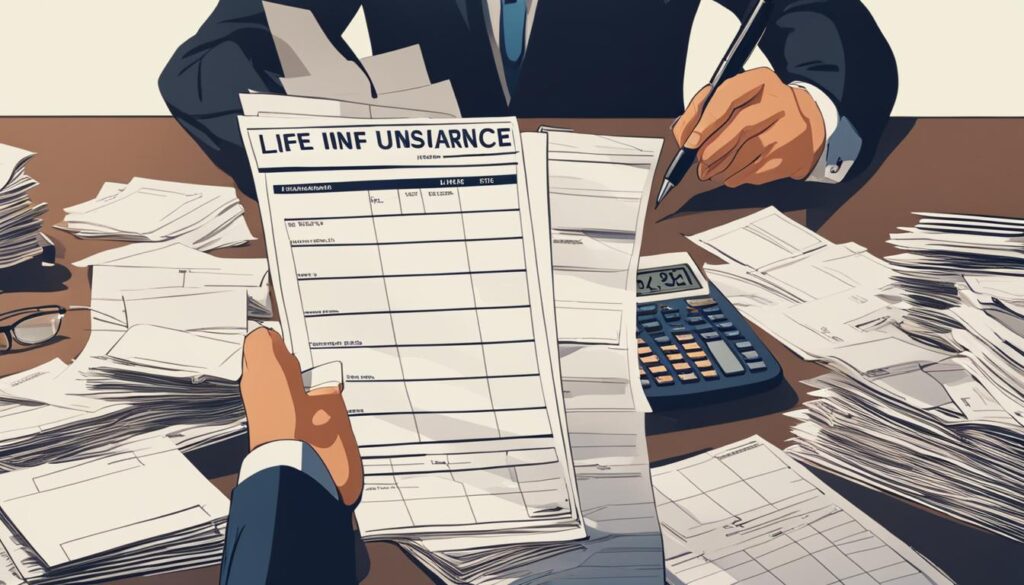Read:14 mins
The number of self-employed professionals in the UK has been steadily increasing over the years, with over 4.39 million self-employed individuals in 2023. Freelancers and self-employed individuals often do not have the same benefits as permanent employees, such as a death-in-service policy. As a result, life insurance becomes essential for freelancers and self-employed individuals to ensure financial protection for their loved ones in the event of their death.
Key Takeaways:
- Life insurance is crucial for freelancers and self-employed individuals in the UK to protect their loved ones financially.
- Freelancers do not have the same benefits as permanent employees, making life insurance even more important.
- There are various types of life insurance available for freelancers, including relevant life insurance, term life insurance, and whole life insurance.
- Income protection cover provides regular income for freelancers in case of illness or injury, ensuring financial security.
- Critical illness cover offers a lump sum payout for freelancers facing serious illnesses or medical procedures.
Why Freelancers Need Life Insurance
Freelancers and self-employed individuals face unique challenges and responsibilities when it comes to their financial security. Unlike traditional employees, freelancers do not have the safety net of employee benefits, such as a death-in-service policy. This makes life insurance an essential consideration for freelancers, providing them with the necessary financial protection in case of unforeseen events.
One of the key benefits of life insurance for freelancers is the ability to ensure that their loved ones are financially protected in the event of their death. Life insurance can cover outstanding debts, such as mortgages or loans, and provide funds to cover funeral expenses. The payout from a life insurance policy can also replace the freelancer’s income, ensuring that their family is not burdened with financial strain during a difficult time.
Moreover, life insurance offers freelancers peace of mind, knowing that they have taken steps to safeguard their family’s future. By securing life insurance, freelancers can have confidence that their loved ones will be taken care of and have the financial resources they need to maintain their lifestyle and meet their financial obligations if the freelancer is no longer there to provide for them.
Benefits of Life Insurance for Self-Employed
There are several key benefits of life insurance for self-employed individuals:
- Financial protection: Life insurance ensures that outstanding debts and funeral expenses are covered, protecting the freelancer’s family from a financial burden.
- Income replacement: Life insurance can provide a lump sum or regular income to dependents, replacing the freelancer’s earnings for a chosen period of time.
- Peace of mind: Knowing that their loved ones are financially protected gives self-employed individuals peace of mind, allowing them to focus on their work and personal well-being.
- Legacy planning: Life insurance can also be used as a means of leaving a financial legacy for family members or supporting charitable causes that are important to the freelancer.

In summary, life insurance is of utmost importance for freelancers and self-employed individuals. It provides vital financial protection for their loved ones in the event of their death and ensures their family’s well-being and financial security. By considering life insurance, freelancers can have peace of mind knowing that their family’s future is safeguarded, allowing them to focus on their work and personal aspirations.
Types of Life Insurance for Freelancers
When it comes to life insurance options for freelancers, there are several types to consider. Each type offers different benefits and suits different needs. Here are three common types of life insurance for freelancers:
1. Relevant Life Insurance
Relevant life insurance is a tax-efficient option for self-employed individuals. It is often paid for by the freelancer’s limited liability company and can provide protection from inheritance tax. This type of insurance allows freelancers to ensure financial security for their loved ones without incurring unnecessary tax liabilities.
2. Term Life Insurance
Term life insurance provides coverage for a specific period, typically ranging from 10 to 30 years. Freelancers can choose the desired term based on their financial obligations and the needs of their dependents. This type of insurance pays out a lump sum in the event of the freelancer’s death during the policy term, offering financial protection for their loved ones.
3. Whole Life Insurance
Whole life insurance offers coverage for the entire lifetime of the insured individual. It does not have a set term like term life insurance. This type of insurance provides a guaranteed payout to the beneficiaries upon the freelancer’s death, regardless of when it occurs. Whole life insurance can be an attractive option for freelancers who want to ensure long-term financial security for their loved ones.
It’s important for freelancers to carefully consider their insurance needs and consult with a financial advisor or insurance specialist to determine the most suitable type of life insurance for their situation. The right choice will depend on factors such as financial goals, budget, and the needs of their dependents.
| Type of Life Insurance | Key Features |
|---|---|
| Relevant Life Insurance | Tax-efficient, paid by the limited liability company, protection from inheritance tax |
| Term Life Insurance | Coverage for a specific period, lump sum payout upon death during the policy term |
| Whole Life Insurance | Lifetime coverage, guaranteed payout upon death |
Income Protection Cover for Freelancers
Freelancers and self-employed individuals often face unique challenges when it comes to financial protection. Unlike traditional employees, they do not have the safety net of sick pay if they are unable to work due to illness or injury. This is where income protection cover plays a crucial role in providing freelancers with a regular income during periods of incapacity.
Income protection cover for freelancers offers peace of mind knowing that even if you are unable to work due to an illness or injury, you will still receive a regular monthly payment. This coverage typically starts after a pre-agreed waiting period, which can vary depending on the policy, and continues until you are able to return to work. It ensures that you can focus on your recovery without worrying about your finances.
Having income protection cover as a freelancer is particularly important because it helps to safeguard your financial stability. It replaces a percentage of your lost earnings, allowing you to meet your everyday expenses, such as rent or mortgage payments, utility bills, and groceries. It also provides you with the flexibility to choose the level of coverage that suits your needs and budget.
Table: Comparison of Income Protection Cover for Freelancers
| Insurance Provider | Waiting Period | Coverage Duration | Maximum Monthly Benefit |
|---|---|---|---|
| Insurance Provider A | 30 days | Up to age 65 | £2,000 |
| Insurance Provider B | 60 days | 2 years | £1,500 |
| Insurance Provider C | 90 days | 5 years | £3,000 |
It’s important to carefully consider the terms and conditions of different income protection cover policies. This includes the waiting period before the coverage starts, the duration of the coverage, and the maximum monthly benefit amount. Comparing different insurance providers can help you find the most suitable coverage for your specific needs.
Overall, income protection cover is a valuable form of financial protection for freelancers. It ensures that you have a regular income to support yourself and your loved ones during times of illness or injury. With the flexibility to choose the coverage that suits your needs, you can have peace of mind knowing that your financial stability is safeguarded.
Critical Illness Cover for Freelancers
Freelancers face unique challenges when it comes to financial protection, especially in the event of a serious illness. That’s where critical illness cover for self-employed individuals comes in. This type of insurance provides a lump sum payout if you are diagnosed with a critical illness or undergo a medical procedure related to a covered illness. It offers essential financial support during your recovery period and allows you to focus on your health without worrying about your finances.
With critical illness cover, you can use the lump sum payment to cover medical expenses, rehabilitation costs, and any necessary lifestyle adjustments. Whether you need to make modifications to your home, seek specialized treatment, or simply cover your everyday living expenses, the payout from your critical illness cover can provide the financial stability you need during this challenging time.
It’s important to note that the specific illnesses covered may vary depending on the insurance policy. Some policies may include a comprehensive list of critical illnesses, while others may have a more limited scope. Before purchasing critical illness cover, carefully review the policy documents to ensure that it covers the specific illnesses and medical procedures that are relevant to your circumstances.
| Benefits of Critical Illness Cover for Freelancers | Summary |
|---|---|
| You receive a lump sum payment if you are diagnosed with a critical illness or undergo a covered medical procedure. | Financial support during your recovery period. |
| The payout can be used to cover medical expenses, rehabilitation costs, and lifestyle adjustments. | Ensures financial stability during a challenging time. |
| The specific illnesses covered may vary depending on the insurance policy. | Review policy documents to ensure coverage aligns with your needs. |
Overall, critical illness cover provides freelancers with the peace of mind and financial protection they need in case of a serious illness. It offers a lump sum payout that can help you navigate the challenges of your recovery period and allow you to focus on your health and well-being. Consider exploring this type of insurance to ensure you have the necessary financial support in the event of a critical illness.

Do Freelancers Need Life Insurance?
Life insurance is an essential form of protection for freelancers. Without the benefits provided by permanent employment, such as paid holiday, sick pay, and maternity/paternity pay, freelancers and self-employed individuals may be at a higher risk if something were to happen to them. Life insurance offers peace of mind and ensures that their family and dependents are financially protected in the event of their death or critical illness.
“Life insurance provides the much-needed financial security that freelancers need to safeguard their loved ones’ future. It offers a safety net that can cover expenses like outstanding debts, mortgage payments, and funeral costs. More importantly, life insurance provides a source of income replacement for dependents, replacing the freelancer’s earnings for a chosen period of time. This financial protection allows freelancers to have peace of mind while focusing on their work and personal wellbeing.”
Life insurance not only provides financial protection for freelancers but also ensures the continuity of their business. In the event of their death, a life insurance payout can help cover any outstanding business debts or liabilities, ensuring that the freelancer’s business can continue operating smoothly. Additionally, life insurance can also be used as a tool for business succession planning, allowing freelancers to pass on their business assets to their chosen successors.
In conclusion, life insurance is a vital consideration for freelancers and self-employed individuals. It provides much-needed financial protection, peace of mind, and ensures the well-being of their family and dependents. By investing in life insurance, freelancers can secure their financial future and focus on their work without worrying about unforeseen circumstances.

Is Life Insurance Tax-Deductible for Freelancers?
As a freelancer or self-employed individual, you may be wondering if life insurance premiums are tax-deductible. Unfortunately, personal life insurance premiums are generally not tax-deductible for self-employed individuals in the UK. This means that you won’t be able to claim the cost of your life insurance premiums as a deductible business expense on your tax return.
However, it’s important to note that any cash sum payout from a life insurance policy is not subject to income tax. This means that if you were to pass away and your beneficiaries receive a lump sum payout from your life insurance policy, they won’t have to pay income tax on that amount.
Exceptions to the Rule
Although personal life insurance premiums are not tax-deductible, there may be certain circumstances where life insurance premiums can be tax-deductible for self-employed individuals. One such circumstance is when you have a key person policy. A key person policy is taken out by a business to protect against the financial loss that would occur if a key employee or freelancer were to die or suffer a critical illness. In this case, the business pays the premiums and can claim them as a deductible expense.
| Policy Type | Tax Deductible? |
|---|---|
| Personal Life Insurance | No |
| Key Person Policy | Yes |
It’s always advisable to consult with a tax professional or an insurance advisor to fully understand the tax rules and regulations surrounding life insurance for freelancers and self-employed individuals. They can provide guidance specific to your situation and help you make informed decisions that align with your financial goals.

Other Insurance Considerations for Freelancers
When it comes to insurance, freelancers have unique needs that go beyond traditional life insurance. As a self-employed professional, it’s important to consider additional insurance options to ensure comprehensive coverage for both yourself and your business.
One key insurance consideration for freelancers is liability insurance. This type of insurance protects you in the event of a lawsuit or claim made against your business. It provides coverage for legal fees, settlements, and damages, giving you peace of mind and financial protection. Liability insurance is especially crucial for freelancers who work directly with clients, as it safeguards you against potential disputes or accidents that could result in costly legal battles.
Another important aspect of insurance for freelancers is protecting your business assets. As a freelancer, your equipment, tools, and technology are essential to your work. Having insurance coverage for these assets ensures that you can replace or repair them in the event of theft, damage, or loss. This not only safeguards your ability to continue working but also prevents significant financial setbacks.
Considering the unique risks that freelancers face, it’s essential to assess your specific needs and circumstances when choosing insurance coverage. While life insurance provides vital protection for your loved ones in the event of your death or critical illness, additional insurance options like liability insurance and asset protection can provide comprehensive coverage for both yourself and your business. By carefully evaluating your risks and selecting the appropriate insurance policies, you can ensure that you have the necessary protection to thrive as a freelancer.
Conclusion
Life insurance is a vital aspect of financial planning for freelancers and self-employed individuals in the UK. As a freelancer, you may not have the same benefits as permanent employees, such as a death-in-service policy. That’s why life insurance is so important for you.
By having life insurance, you ensure that your loved ones are financially protected in the event of your death. Whether it’s covering your mortgage, outstanding debts, or funeral expenses, life insurance provides the necessary financial security.
Additionally, life insurance can replace your earnings for a chosen period of time, providing a regular income to your dependents. This allows them to maintain their standard of living and meet their financial obligations.
Overall, the importance of financial protection for self-employed individuals cannot be overstated. Life insurance offers you peace of mind, knowing that your family and dependents will be taken care of no matter what happens. So, don’t overlook the importance of life insurance and ensure you have the necessary coverage in place.
FAQ
Why do freelancers need life insurance?
Freelancers need life insurance to provide financial protection for their loved ones in the event of their death. Life insurance covers outstanding debts, mortgage payments, and funeral expenses, and can also provide a lump sum or regular income to dependents.
What types of life insurance are available for freelancers?
Freelancers have various options for life insurance, including relevant life insurance, term life insurance, and whole life insurance. The choice depends on individual needs and preferences.
What is income protection cover for freelancers?
Income protection cover provides a regular monthly payment to freelancers if they are unable to work due to illness or injury. This ensures they continue to receive income and financial stability.
What is critical illness cover for freelancers?
Critical illness cover provides a lump sum payout if a freelancer is diagnosed with a critical illness or undergoes a medical procedure related to a covered illness. This financial support helps freelancers focus on their recovery without worrying about their finances.
Is life insurance tax-deductible for freelancers?
Personal life insurance premiums are not tax-deductible for self-employed individuals. However, any cash sum payout from a life insurance policy is not subject to income tax. There may be certain circumstances where life insurance premiums can be tax-deductible for self-employed individuals, such as key person policies where the business would suffer a financial loss if the freelancer were to die.
What other insurance considerations should freelancers have?
In addition to life insurance, freelancers should consider liability insurance to protect against legal fees in case of a lawsuit. They might also need additional coverage for business assets and equipment.